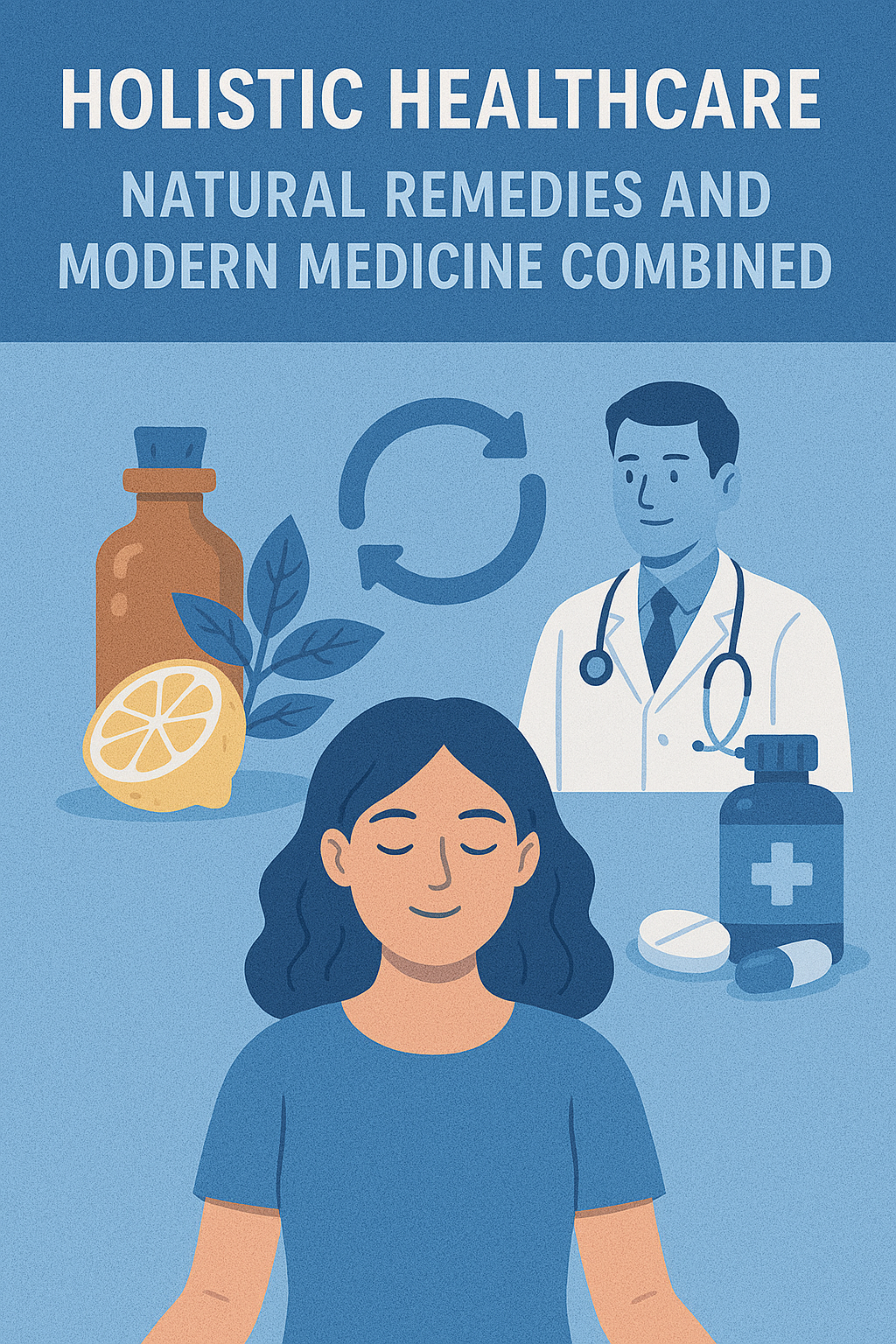Introduction: The Rise of Holistic Healthcare
Healthcare is evolving, and the integration of natural remedies and modern medicine is gaining momentum. Instead of relying solely on pharmaceutical treatments, people are turning to a more holistic approach, combining alternative therapies, nutrition, lifestyle changes, and conventional medicine.
This integrative approach aims to treat the whole person—mind, body, and spirit—rather than just the symptoms of a disease. But how does holistic healthcare work? Can natural remedies and modern medicine truly complement each other? Let’s explore the fascinating world of holistic healing.
What is Holistic Healthcare?
Holistic healthcare is an approach that addresses the root cause of illnesses rather than just treating symptoms. It emphasizes the interconnection between physical, emotional, and mental well-being.
Key Principles of Holistic Healthcare:
✔ Prevention over Cure: Focuses on lifestyle, diet, and mental health to prevent diseases.
✔ Individualized Treatment: Recognizes that every person’s health needs are unique.
✔ Balance Between Natural & Scientific Approaches: Uses evidence-based modern medicine alongside traditional and alternative therapies.
✔ Mind-Body Connection: Acknowledges the role of mental health in physical wellness.
The Role of Natural Remedies in Healthcare
For centuries, natural remedies have been used to treat ailments. While not all alternative therapies have scientific backing, many have been recognized for their effectiveness.
1. Herbal Medicine
Plants have been used for healing across different cultures. Some scientifically supported herbal remedies include:
- Turmeric: Reduces inflammation and supports joint health.
- Ginger: Helps with digestion, nausea, and immune support.
- Echinacea: Strengthens the immune system to fight infections.
2. Acupuncture and Traditional Chinese Medicine (TCM)
Acupuncture involves inserting fine needles into specific points on the body to:
✔ Relieve chronic pain
✔ Improve circulation
✔ Reduce stress and anxiety
3. Chiropractic Care and Osteopathy
These therapies focus on spinal alignment and musculoskeletal health to:
✔ Reduce back and neck pain
✔ Improve posture and flexibility
✔ Enhance nervous system function
4. Essential Oils and Aromatherapy
Essential oils are widely used for their therapeutic properties:
- Lavender: Reduces stress and promotes sleep.
- Peppermint: Relieves headaches and improves digestion.
- Tea Tree Oil: Has antimicrobial and anti-inflammatory properties.
5. Meditation and Mindfulness
Mental health plays a critical role in overall well-being. Mindfulness and meditation help to:
✔ Reduce stress and anxiety
✔ Improve focus and concentration
✔ Lower blood pressure
Modern Medicine: Scientific Advancements in Healthcare
While natural remedies have benefits, modern medicine plays a crucial role in treating serious illnesses and ensuring patient safety.
1. Pharmaceutical Medications
Modern medicine has made tremendous progress in treating diseases such as diabetes, hypertension, and cancer. Prescription drugs help:
✔ Control chronic conditions
✔ Manage pain and infections
✔ Support post-surgery recovery
2. Medical Technology and Diagnostics
Advanced tools like MRI, CT scans, and blood tests allow for early disease detection and precise diagnosis.
3. Surgical Procedures and Interventions
Modern surgery has evolved with minimally invasive techniques, robotic-assisted surgeries, and laser treatments that speed up recovery times.
4. Vaccinations and Preventive Medicine
Vaccines have helped eliminate or reduce diseases like polio, measles, and COVID-19. Preventive medicine saves lives and improves public health.
How Holistic Healthcare Combines Natural and Modern Approaches
Holistic healthcare blends natural healing methods with evidence-based modern medicine to provide comprehensive care.
1. Functional Medicine: The Best of Both Worlds
Functional medicine looks at:
✔ Lifestyle and diet adjustments to support health.
✔ Lab testing and modern diagnostics to assess conditions.
✔ Natural supplements alongside medications.
2. Integrative Oncology: Supporting Cancer Treatment
Cancer patients often use holistic therapies alongside chemotherapy or radiation:
✔ Acupuncture: Reduces nausea from chemotherapy.
✔ Mindfulness and Yoga: Helps manage stress and pain.
✔ Nutritional Support: Aids in strengthening the immune system.
3. Mental Health and Holistic Wellness
Mental well-being is just as important as physical health. A holistic approach to mental health includes:
✔ Therapy and Counseling: Professional guidance for emotional balance.
✔ Herbal Supplements: St. John’s Wort and Ashwagandha for stress relief.
✔ Mindfulness Practices: Meditation and deep breathing techniques.
Benefits of Holistic Healthcare
✔ Personalized Care: Treatments are tailored to individual needs.
✔ Fewer Side Effects: Natural therapies often have milder side effects compared to pharmaceuticals.
✔ Long-Term Well-being: Focuses on preventive care rather than just symptom relief.
✔ Improved Quality of Life: Encourages balance, relaxation, and mental clarity.
Challenges of Integrating Natural and Modern Medicine
While holistic healthcare has many advantages, challenges remain:
- Lack of Scientific Research: Some natural remedies need more scientific validation.
- Regulation Issues: Herbal supplements are not always FDA-approved.
- Medical Skepticism: Some doctors may not fully support holistic approaches.
- Potential Drug Interactions: Certain herbs can interfere with prescribed medications.
To ensure safe integration, always consult a qualified healthcare provider before using any alternative treatments.
How to Find a Holistic Healthcare Provider
Choosing a provider who understands both natural and modern medicine is key.
Steps to Find the Right Provider:
✔ Look for certified integrative medicine doctors.
✔ Check if they have experience with natural treatments.
✔ Ask about treatment options beyond pharmaceuticals.
✔ Ensure they respect patient choices and preferences.
